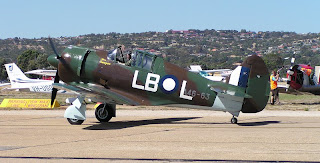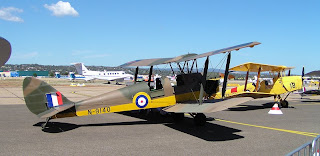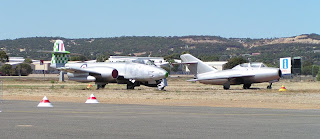Up the country - May-June 2010
On May 30 a friend and I went up to the Barossa Valley, through Nuriootpa to a town named after his home, Greenock, in Scotland. Apparently, the Scottish one is pronounced the way its spelled, "Green ock". The Aussie one is pronounced "Grennock". Bet you didn't know that!
The main agenda was to see Lincoln Nitschke's Aviation Museum. We were early so we managed to find a nice pub with an open fireplace (it's getting chilly this time of year), the Greenock Hotel (there's no surprise there!).

I was impressed. It was a dinkum Aussie pub with the wide verandah to the kerb, and a steady stream of local clients, and (as you see above) a nice polished wood bar in the dining room. The fire was blazing, and the food was good solid country serves, not the woossy-snob city stuff. There was even a small library of novels next to the fire - and it had works of popular authors, too - which could persuade me to sit there all afternoon sipping local wines and reading by the fire.
All the same we pressed on to the museum after lunch. The quarters were cramped, but there were plenty of aircraft, components, models and memorabilia not commonly available. The collection was helped by a twist of history. After WW2, a lot of military aircraft were sold for a song, about $10 for a twin-engine trainer minus engines, and about $5 extra with.
The Avro Ansons from a local training squadron were popular. Farmers lopped the wings off and towed them home, to salvage bolts and metal fittings, and put the hulk out for a chicken coop. The Nitschke collection has two Anson airframes, one with skin and one without, plus an Anson cockpit section. What it has which I have not seen elsewhere is a near complete DeHavilland Mosquito fighter, lacking only the wings outboard of the engines, plus another nose section of a bomber version.

Outside, Lincoln has an English Electric Canberra jet bomber parked (one which came here from England, not the Aussie-built version) and alongside it, what looks like a Mustang Mk22 in markings of the RAAF squadron once based at Mallala. The RAAF base is now a motor-sports track.
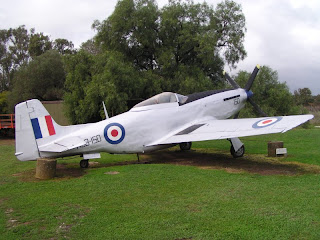
It's not a real bird, though. It was scratch-built as a private project. Other sheds house a small collection of classic farm vehicles and 1940s-50s trucks. Here's the International T9 Crawler tractor. I think I had a Matchbox bulldozer like this!

Moving right along, last Sunday, 13 June, I visited - or re-visited - Clare, about 100 km miles north, with old mate Peter, and his old mate Mark. We took a break halfway at the Grasshopper Roadhouse, Tarlee,

When dad was retired up at Snowtown, I'd stop there for a break, with the kids, whenever we drove up to visit. After that, we pressed on through Clare and out north, onto dirt roads through Hilltown. When we reached these trees flanking the road, we figured we were "home". Peter and I, and others, spent a lot of time up here in the 1960s and '70s.

What had changed, not that it's very clear in this shot, is the giant wind-turbine generators around the horizon from north to west. Peter's obviously photographing them.
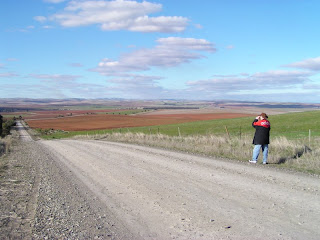
We headed across the Camel Hump Range and doubled back to the Camel Hump itself, seen on the right of this shot.

There's Peter and Mark as we strolled the range. Back in the 1960s and early 1970s the area was haunted by UFOs, particularly around here. We learned a lot about social dynamics back then.
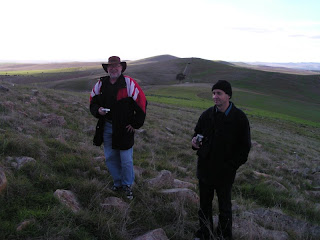
There were plenty of kangaroos around the area. Nice to tourists, but not to farmers.
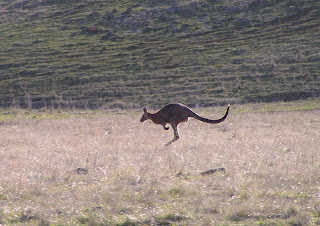
From the range we looked down on the farm I first stayed at in 1968. Then it was owned by a very hospitable old couple who, after a short while, retired to the city. He was a WW1 veteran, and built the farm up himself.
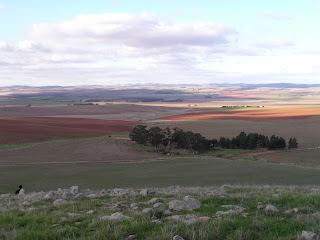
The farmhouse itself has had the yard slighty revamped and appears still in good repair and occupied.

Back in Clare as evening fell, we decided to have dinner at the Bentley Hotel (not "Benley" as Wikipedia called it in the previous link), another great Aussie pub. Peter did his bit for the farmers, he ordered kangaroo steak.
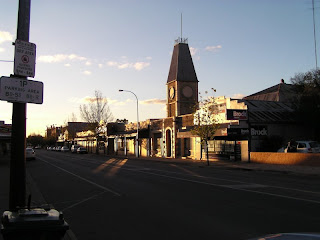
That's the street at sundown, as it was getting cold. It's been 0ºC overnight there. Can't believe I used to camp out in the weather Clare threw at us!
The main agenda was to see Lincoln Nitschke's Aviation Museum. We were early so we managed to find a nice pub with an open fireplace (it's getting chilly this time of year), the Greenock Hotel (there's no surprise there!).

I was impressed. It was a dinkum Aussie pub with the wide verandah to the kerb, and a steady stream of local clients, and (as you see above) a nice polished wood bar in the dining room. The fire was blazing, and the food was good solid country serves, not the woossy-snob city stuff. There was even a small library of novels next to the fire - and it had works of popular authors, too - which could persuade me to sit there all afternoon sipping local wines and reading by the fire.
All the same we pressed on to the museum after lunch. The quarters were cramped, but there were plenty of aircraft, components, models and memorabilia not commonly available. The collection was helped by a twist of history. After WW2, a lot of military aircraft were sold for a song, about $10 for a twin-engine trainer minus engines, and about $5 extra with.
The Avro Ansons from a local training squadron were popular. Farmers lopped the wings off and towed them home, to salvage bolts and metal fittings, and put the hulk out for a chicken coop. The Nitschke collection has two Anson airframes, one with skin and one without, plus an Anson cockpit section. What it has which I have not seen elsewhere is a near complete DeHavilland Mosquito fighter, lacking only the wings outboard of the engines, plus another nose section of a bomber version.

Outside, Lincoln has an English Electric Canberra jet bomber parked (one which came here from England, not the Aussie-built version) and alongside it, what looks like a Mustang Mk22 in markings of the RAAF squadron once based at Mallala. The RAAF base is now a motor-sports track.

It's not a real bird, though. It was scratch-built as a private project. Other sheds house a small collection of classic farm vehicles and 1940s-50s trucks. Here's the International T9 Crawler tractor. I think I had a Matchbox bulldozer like this!

Moving right along, last Sunday, 13 June, I visited - or re-visited - Clare, about 100 km miles north, with old mate Peter, and his old mate Mark. We took a break halfway at the Grasshopper Roadhouse, Tarlee,

When dad was retired up at Snowtown, I'd stop there for a break, with the kids, whenever we drove up to visit. After that, we pressed on through Clare and out north, onto dirt roads through Hilltown. When we reached these trees flanking the road, we figured we were "home". Peter and I, and others, spent a lot of time up here in the 1960s and '70s.

What had changed, not that it's very clear in this shot, is the giant wind-turbine generators around the horizon from north to west. Peter's obviously photographing them.

We headed across the Camel Hump Range and doubled back to the Camel Hump itself, seen on the right of this shot.

There's Peter and Mark as we strolled the range. Back in the 1960s and early 1970s the area was haunted by UFOs, particularly around here. We learned a lot about social dynamics back then.

There were plenty of kangaroos around the area. Nice to tourists, but not to farmers.

From the range we looked down on the farm I first stayed at in 1968. Then it was owned by a very hospitable old couple who, after a short while, retired to the city. He was a WW1 veteran, and built the farm up himself.

The farmhouse itself has had the yard slighty revamped and appears still in good repair and occupied.

Back in Clare as evening fell, we decided to have dinner at the Bentley Hotel (not "Benley" as Wikipedia called it in the previous link), another great Aussie pub. Peter did his bit for the farmers, he ordered kangaroo steak.

That's the street at sundown, as it was getting cold. It's been 0ºC overnight there. Can't believe I used to camp out in the weather Clare threw at us!



